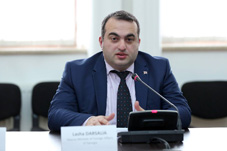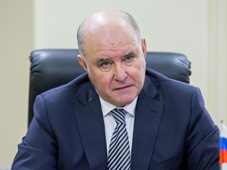
Tbilisi events loom over 48th round of Geneva International Discussions
By Levan Abramishvili
Thursday, July 4
The 48th round of the Geneva International Discussions (GID), which started on July 2, came to an end yesterday without outcomes.
Georgian Deputy Foreign Minister Lasha Darsalia, who represented the country at the meetings said that “traditionally and unfortunately, the Russian Federation left the negotiation table as soon as the issue of the return of IDPs was mentioned.”
“Additional tough circumstances were added to the ongoing difficulties. From the beginning, the Georgian delegation and the partners emphasized that already difficult Georgian-Russian relations do not need additional complications,” noted Darsalia.
After the meetings, Russian Deputy Foreign Minister Grigory Karasin said that the June 20-21 events made the atmosphere at the Geneva talks tense.
“I felt that the co-chairs were very nervous, because they didn’t know if there would be open confrontation at the meetings. We expressed our opinions and agreed that they were not part of the agenda. We should continue our work and discuss the necessary topics, which are security, humanitarian bloc, non-use of force, etc.” he noted.
“The meeting was affected by the statements of radicals and irresponsible assertions from Tbilisi,” added Karasin.
Karasin mentioned the comments of the President of Georgia Salome Zourabichvili had a “bomb explosion effect.”
“The statement of Zourabichvili had a bomb explosion effect. This was followed by the proclamations of the protesters. All of this was broadcast on TV. It couldn’t have been overlooked,” he said.
Karasin referred to the comment Zourabichvili gave to Euronews after the June 20-21 events in response to Putin’s ban of direct flights from Russia to Georgia.
“Tourists should continue to come, because they love Georgia, and politicians and leaders should solve the problems that are at the bottom of what has happened and solving this problems mean that we have to reunify Georgian territories, but that should not affect the tourists,” said Zourabichvili in an interview with Euronews.
“Why did it cause the bomb explosion effect? I’m one of those, who was affected by this ‘explosion’. When neighboring countries have mutual relations, the leader of the country shouldn’t let themselves to make such statements. We should approach this topic very carefully and choose our statements wisely,” said Karasin regarding Zourabichvili’s comments.
According to the Russian Deputy Foreign Minister, ‘sanctions’ don’t correspond to the current situation, referring to the direct flights ban. According to him, Russia's action was an adequate reaction to the threats that could have been potentially created for Russian citizens. Karasin also commented on the statements of Akaki Bobokhidze, MP of the opposition party United National Movement. Karasin mispronounced the MP’s name.
“It is very good that there are no threats yet, but at any moment they could be created. When we hear statements such as of your MP Bobashvili’s [Akaki Bobokhidze], or whatever his name is, I forgot… I hear a lot of irresponsible statements. In such situtaiton, the state should take the initiative and do everything so that our citizens don’t suffer,” said Karasin.
During the confrontation with the Russian MP Gavrilov at the Georgian Parliament on June 20, Bobokhidze said: ‘I have been killing you and will kill you in the future.’
He later explained that what he meant with this was that he “has been fighting against occupation and I am ready to fight in future as well.”
Georgian representative at the talks, Darsalia told the media that the issue of the death of Irakli Kvaratskhelia was also raised during the discussions. According to him, the Georgian side asked to receive full information regarding the matter from Russia.
29-year-old Irakli Kvaratskhelia committed suicide in unclear circumstances, in an interrogation room, in the occupied Abkhazia region on March 10, 2019. He was detained by the de-facto government for crossing of the so-called border.
While Darsalia called the Discussions another “failure, like the rest of the 47 talks”, Karasin said that the parties discussed “all topics, but I would say, the main issue remains unsolved. This is the status, and, as you say, which is your interpretation, deoccupation. Whenever we get close to this old topic, the temperature rises,” he said.
“We should all work together for de-escalation of the current situation. We should take steps to lower the temperature and tensions between the countries,” said Darsalia.
“Technically, all rounds that we had up until this point, have been failures. What is meant by ‘failure’ is that whenever the issue of IDPs is raised, Russia leaves the discussions. This has been the case in all previous rounds too,” he added.
The parties have agreed to meet again in October for the next round of Discussions.
Spokesperson for Foreign Affairs and Security Policy of European Union issued a statement regarding “the latest developments in relations between the Russian Federation and Georgia.“
“We consider the Russian decision to ban flights to Georgia as of 8 July unjustified and disproportionate,” reads the statement.
The issue of the closure of crossing points at the Abkhaz so-called border was also mentioned in the statement.
“Additionally, the restrictions that were imposed on the two crossing points at the Abkhaz Administrative Boundary Line as of 27 June severely affect freedom of movement and cause further difficulties for the conflict affected population. They need to be lifted to avoid further humanitarian hardship.”
The statement urges both sides to use this round of the Geneva International Discussions “effectively to lower tensions and to alleviate the situation of the affected population.”
The decision of Vladimir Putin to ban direct flights between Russia and Georgia came after protests in Tbilisi that were sparked by Russian MP giving a speech from the Speaker’s seat in the Georgian Parliament during the Inter-parliamentary Assembly on Orthodoxy session.
The Geneva International Discussions are international talks, launched in Geneva, Switzerland, in October 2008, to address the consequences of the 2008 conflict in Georgia. Co-chaired by the OSCE, the EU, and the UN, the Geneva process brings together representatives of the participants of the conflict—Georgia, Russia, and Georgia's occupation regimes from Abkhazia and South Ossetia, as well as the United States.


